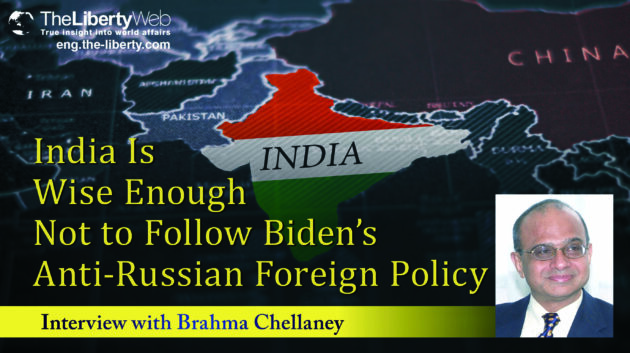India Is Wise Enough Not to Follow Biden’s Anti-Russian Foreign Policy
The Liberty spoke with Brahma Chellaney, an Indian analyst, who has raised warnings against China’s expansionism (as of October 8th).
Brahma Chellaney

He is a Professor of Strategic Studies at the New Delhi-based Center for Policy Research and Fellow at the Robert Bosch Academy in Berlin. The author of nine books, including Asian Juggernaut; Water: Asia’s New Battleground; and Water, Peace, and War: Confronting the Global Water Crisis.
―― We believe that we, the free world, can’t contain China without involving Russia in the encirclement of China. What are your thoughts on this?
Dr. Brahma: Geographically, Japan, India and Russia surround China from three different sides. All three have open or hidden concerns about China’s expansionism. Current U.S. policies, however, have counterproductively fostered an expanding partnership between Russia and China by pushing Moscow closer to Beijing.
US President Joe Biden’s overriding focus on punishing Russia for its invasion of Ukraine threatens to exacerbate Asian security challenges, especially by aiding the further rise of an expansionist China. The U.S.-led sanctions against Moscow and Europe’s shift away from Russian energy effectively put Russia, the world’s richest country in natural resources, in the pocket of a resource-hungry China. This also allows China to build an energy safety net through greater land-based energy imports from Russia. Land-based energy imports, unlike sea-borne supplies, cannot be blockaded even if China invaded Taiwan.
Against this background, it is important for the democratic world not to act in ways that would cement the China-Russia alliance. It is also important for Asia’s leading democracies, Japan and India, to maintain stable relationships with Russia.
―― If the U.S. perpetuates the war in Ukraine and focuses on its involvement in Europe, China could exploit this opportunity and take military action in Taiwan, the South China Sea, and other areas. What is your assessment of the risk that the West will lose its ability to respond to China as a result of its obsession with Russia?
Dr. Brahma: The danger that Taiwan could become the next Ukraine is real. The live-fire Chinese military drills around Taiwan in August, by simulating an air and sea blockade, demonstrated China’s combat capability to accomplish what President Xi Jinping has called a “historic mission” to absorb that island democracy. The drills allowed Chinese troops to practice enforcing Taiwan’s gradual economic strangulation or quarantine. This suggests that Xi could prefer a strategy of calibrated squeeze so as to force the island to merge with China.
But in a reminder that any Chinese operation to cut off access to Taiwan’s airspace and waters would likely intrude into Japanese airspace and perhaps pull Japan into any potential war over Taiwan, five missiles fired by China during its drills overflew Taiwan and landed in Japan’s exclusive economic zone. Taiwan, Imperial Japan’s first colony, is geographically an extension of the Japanese archipelago.
Taiwan, with the world’s 22nd-largest economy by gross domestic product, plays an important, even if indirect, role in Asian security — its autonomous existence ties up a sizable portion of the armed forces of China. Deterring a Chinese attack on Taiwan has become more pressing than ever. Admiral Philip Davidson, who led the U.S. Indo-Pacific Command, told Congress last year that a Chinese invasion of Taiwan could happen by 2027. But U.S. intelligence now reportedly believes that Xi could move against Taiwan much earlier, on President Joe Biden’s watch — in the two-year period between the Chinese Communist Party congress this autumn and the next U.S. presidential election in 2024.
Biden’s growing involvement in the Ukraine war is distracting the U.S. from Taiwan’s China threat. Taiwan’s fall would significantly advance China’s hegemonic ambitions in Asia and upend the balance of power in the Indo-Pacific, not least by enabling China to break out of the “first island chain” that runs from the Japanese archipelago, through Taiwan, the Philippines, and on to Borneo, enclosing China’s coastal seas. The risks are particularly acute for Japan, whose then-Deputy Prime Minister Taro Aso warned last year that, after Taiwan, “Okinawa could be next.”
―― President Xi Jinping is expected to continue for a third term and rule China for life. What political ambitions do you think he would like to achieve in his lifetime? How will Xi’s ambition affect India’s national security?
Dr. Brahma: Xi Jinping has ruled with an iron fist, and now he is crowning himself as the new emperor of China by breaking the two-term presidential limit. Xi has centralized nearly all decision-making power in his own hands.
Xi’s China increasingly resembles a form of authoritarian police state that uses technology to keep its own citizens under constant surveillance. And as the Muslim gulag in Xinjiang and the repression in Tibet underscore, Xi’s treatment of ethnic minorities borders on genocide.
In recent years, some have compared Xi to Adolf Hitler, even coining the nickname “Xitler.” Fascism with Chinese characteristics is taking root. With “Xi Jinping Thought” enshrined in the national constitution and turned into the central doctrine guiding the ruling Chinese Communist Party (CCP), China’s destiny is now in the control of one party, one führer and one ideology.
Inside China, Xi’s authority is absolute. The biggest challenge to Xi’s despotism comes not from within China’s borders but from other parts of the world. Thanks to Xi’s expansionist policies, an international pushback against China has spread to countries that once avoided upsetting Beijing. Xi is opening the eyes of the world to the true nature of the Chinese state.
Under his leadership, China will remain a threat to India. China’s relentless expansionism in the frigid high Himalayas through furtive territorial encroachments has fostered a nearly 30-month-long military standoff with India that persists despite rival forces pulling back from some confrontation sites.
More fundamentally, the Himalayan encroachments have served as a reminder that, unlike Russia’s frontal, full-force attack on Ukraine, the Chinese Communist Party prefers a slice-by-slice approach centered on stealth, deception and surprise to expand the country’s frontiers.
―― Do you think Xi will pursue the unification of Taiwan?
Dr. Brahma:Just as Putin was clear about his plans for invading Ukraine, so has Chinese President Xi Jinping been clear about forcibly absorbing Taiwan — a development that would drive the final nail in the coffin of America’s global preeminence.
That the Western sanctions campaign against Russia has largely been ineffective will only embolden Xi’s expansionist agenda. Xi took a victory lap in Hong Kong after rapidly turning this city (one of Asia’s freest cities) into a repressive police state.
When sanctions have proved ineffectual in changing Russia’s behavior, any similar sanctions would fare even worse against China, whose economy is about 10 times larger than Russia’s. Indeed, the damage to Western economies from Russia-type sanctions against China would likely dwarf the current economic pain that the West is bearing from its sanctions on Moscow.
Historically, Beijing’s claim to Taiwan as an inalienable part of China is dubious, at best, and based on revisionist history. For most of its history, Taiwan was inhabited by non-Chinese peoples – Malayo-Polynesian tribes – and had no relationship with China. Geographically, the main island of Taiwan, formerly known as Formosa, is closer to the Philippines than to the Chinese mainland; the Philippines’ northernmost territory of Mavulis Island is located just 80 kilometers from Taiwan’s shores.
Democratic Taiwan must be defended against any aggression launched by the world’s largest autocracy.
―― India has adopted its own foreign policy, such as buying energy from Russia rather than agreeing to Western sanctions against Russia. What is the purpose of this policy?
Dr. Brahma: U.S. President Joe Biden’s concerted effort to cajole nations into joining the American-led coalition against Russia recalls the famous words of the legendary anti-apartheid leader Nelson Mandela, who said the grievous mistake some Westerners make is to insist that “their enemies should be our enemies.”
In the conflict between the West and Moscow over Russia’s invasion of Ukraine, much of the non-Western world has declined to take sides. So why has Biden especially bristled at India’s independent stance when the world’s major non-Western democracies — from Brazil and Mexico to South Africa and Indonesia — have all chartered a course of neutrality?
Because India is the world’s largest democracy, its neutrality undermines Biden’s narrative that the conflict symbolizes a “battle between democracy and autocracy.”
The US values its strategic autonomy. So does India. Undermining its ties with Moscow would make India dependent on America, whose unpredictability is legendary.
India’s measured response to the Russian invasion of Ukraine enjoys bipartisan support at home. For India, the US has increasingly become an important strategic partner. But Russia remains an equally important friend.
―― It’s sad to say, but the Japanese government seems to simply follow US foreign policy and doesn’t consider the risk of standing against Russia, our neighboring country. We believe that Japan should work as a bridge between the West and Russia, and end this war as soon as possible. Could you share your view on the present Japanese foreign policy?
Dr. Brahma: The Japanese government has followed the US lead on Russia, including imposing sanctions on Moscow. But will this advance or harm Japan’s own economic and security interests?
In response to Japan’s sanctions, Moscow has responded with counter-sanctions, including suspending negotiations with Tokyo on a peace treaty. It might next target Japanese energy interests, just as it has weaponized gas supplies in response to European sanctions, causing immediate pain in Europe, where a recession now looms.
Japanese companies have invested in the Russian Sakhalin-1, Sakhalin-2 and Arctic LNG 2 projects, each of which has been deemed essential for Japan’s energy security. Replacing just its Sakhalin-2 LNG with spot-market LNG could raise Japan’s total yearly import bill by as much as 50% on current trends.
Japan’s interests would be better served by a more nuanced position. Japan should try to play the role of a bridge-builder to end the war in Ukraine.



















